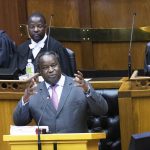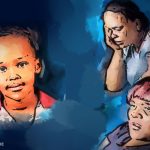Lack of student funding still an issue
Students have been protesting at the start of the academic year against financial exclusion and a lack of accommodation. It’s an all too familiar situation, but what are the alternatives?
Author:
16 March 2020

In a silent but powerfully moving demonstration, students at the University of KwaZulu-Natal’s Pietermaritzburg campus poured their hearts out on pieces of cardboard in the shape of faces.
Their fear? Being financially excluded from the institution when they are on the verge of reaching their dreams and making their parents proud by being university graduates. Students at the university – which formed in 2004 when the University of Durban-Westville merged with the University of Natal – fear being kept off campus after being told they need to pay 15% of their historic debt before being allowed to register as students.
One of the messages read: “This email is to brief on the reasons behind me facing financial exclusion. I have outstanding fees of about R18 688.36 of which I need to settle 15% of, of which R2 803.25 plus registration fees that cost R6 500 before I could be cleared for registration. I would have settled this debt if I was able but then my mother is unemployed and there is zero probability that we will be able to raise approx R9 000 on our own. Thus, I am in need of any financial assistance that I can receive [sic].”
Related article:
In January, students brought the university to a standstill resulting in lectures on all of its campuses being suspended as aggrieved students disrupted the registration and orientation process.
Financial exclusion is at the heart of the protests that forced several universities around South Africa to shut down, but there are other issues that were raised during the strikes.
University of the Witwatersrand student representative council (SRC) president Thuto Gabaphete has called for “one bed, one student”. Unpaid National Student Financial Aid Scheme (NSFAS) funds and a lack of accommodation are issues that were raised at the Tshwane University of Technology, while University of the Western Cape students want management to attend to the registration and accommodation problems on that campus.
Jane Quin, a lecturer in educational development at the University of KwaZulu-Natal, was leading the silent demonstration titled the “registration vs exclusion wall” on the university lawns. “When the students are in the middle of completing their studies, they are being expelled with debt, a debt that was enabled by an institution,” she said.
Quin added that management is not in touch with the reality students face. “They do not recognise students as individuals, as humans, anymore. They talk about them as numbers.”
One bed, one student
One of the students who protested against the lack of accommodation at Wits University, Nomonde Foli, 41, sleeps in a 24-hour laboratory on the education campus in Parktown. “Some of them [students], they don’t even have a blanket. At least I have a blanket and a pillow. It’s a very painful situation,” she said.
The third-year education student, who doesn’t have funding, uses the institution’s bathrooms. “I have no place where I can hang my face towel and underwear. I keep it in the plastic and place my clothes behind the computers.”
Foli asks fellow students to wash her clothes. As for food, “it helps not to expect luxury. I have bread and peanut butter. That’s okay.”
At night, she pretends to be an accommodated student by going to the dining hall for coffee. Despite all the challenges she faces, she will not deregister as earning a degree is her only way out of poverty.
Free education still a pipe dream
For University of Zululand student Justice Ncube, 26, dealing with NSFAS funding has been full of ups and downs. Ncube admits that many like him were duped into believing that there was free education.
“If you do not qualify for NSFAS or meet their requirements, then there is no free education. In any case, NSFAS wants the money back when or if the students start working. It’s a trap, there is no free education. There is free registration, but the rest you have to figure out on your own,” he said.
Ncube’s remarks follow former president Jacob Zuma’s announcement of free higher education. “Having amended the definition of poor and working-class students, government will now introduce fully subsidised free higher education and training for poor and working-class South African undergraduate students, starting in 2018 with students in their first year of study at our public universities. Students categorised as poor and working class, under the new definition, will be funded and supported through government grants not loans,” Zuma said.
Ncube’s age-mate, Thuthukani Dobe, 26, has a master’s degree in development studies. He received NSFAS funding from 2016 to 2018. “NSFAS does not fund honours or masters students. I pay for myself.”

Dobe said the government needs to consider funding postgraduates, especially in historically disadvantaged institutions. “The logic in my situation is that I should be working, but there are no jobs. I have two qualifications [one in international communications and an honours in communications] and the reason why I am furthering my studies is because of the high level of unemployment.”
Ncube and Dobe have been affected by the ongoing violent strike, during which a police van was petrol bombed. When New Frame visited the University of Zululand campus just outside Empangeni in northern KwaZulu-Natal, the facility looked like a ghost town with remnants of broken bottles strewn across the street and burn marks on the tar. There was a highly visible police presence outside the campus while inside it was evident that the institution had not been cleaned.

Desperate moves
Quin agrees and sympathises with the students. “Half our students are using NSFAS to support their families back home, for goodness sake. You cannot expect people with no money to refund their own education studies. The sad thing about all of this is that the people who are in their masters studies now are the ones who’ve managed to overcome and can make a real difference.”
Fundamentally, higher education should be free. But it is not, she said.
Former Durban University of Technology SRC general secretary and current student union president Sbonelo Ngubane has other concerns, the biggest of which involves conditions affecting female students.
“We have spoken a lot as a country about gender-based violence, but no action has been taken. What has been happening in female residences is that there have been break-ins and cases where female students were raped or sexually assaulted,” said Ngubane.
Related article:
“These young women are paying to live in those residences and they deserve personal security, and that is not forthcoming from the side of the university.”
Ngubane said the issue of female students could not be separated from financial exclusion.
“Female students are forced to go and sell their bodies to rich men because they cannot afford to pay their fees. Who are we to blame women who subject themselves to prostitution because they do not have any other choice?” He added that you could not talk about gender-based violence without visiting the issue of financial exclusion.
“We are talking about young girls and women who will one day become mothers of households and have their children. How much of a psychological damage has been done? It raises the question of what kind of society are we building?”
It needn’t be this way
In The Conversation article published in 2019, four scholars write about why it needn’t be this way. Salim Vally, Enver Motala, Mondli Hlatshwayo and Siphelo Ngcwangu say the students’ protest against “registration fees, student accommodation, food and other issues” are “compounded by the inefficiency of the country’s student financial aid scheme”.
“The present situation – where thousands of students are turned away while others are drowning in debt – is simply untenable. It deepens the crisis faced by students. University managements should make common cause with students and pressurise the state instead of relying on charity, band-aid solutions or even worse, the violence of private security. All of these are unsustainable,” they say.
They add that free higher education for all is not only desirable but also entirely possible. However, “using the bureaucratic devices of the National Student Financial Aid Scheme to mediate this crisis will fail and only deepen social conflict”.
Related article:
Saleem Badat is the programme director for international higher education and strategic projects at the Andrew W Mellon Foundation. He writes in Deciphering the Meanings, and Explaining the South African Higher Education Student Protests of 2015-16: “One of the most profound and moving placards displayed during the student protests had to be ‘Our Parents were SOLD dreams in 1994. We are just here for the REFUND.’
“Higher education holds the promise of contributing to social justice, economic and social development, and democratic citizenship. Yet, this promise often remains unrealised and higher education instead becomes a powerful mechanism of social exclusion and injustice … Access to and success in higher education continue to be conditioned by social class and race.”
Government’s response
Minister of Higher Education, Science and Technology Blade Nzimande has been engaging with institutions of higher learning in recent weeks to address the diverse issues affecting millions of students, according to the department. But instead of responding to specific questions from New Frame, it redirected queries to various previously issued statements.
How exactly will the government address the issues affecting higher education in South Africa? Quin has little faith that the steps required will be taken to benefit those in need.
“The problem here is that the government knows that it is a trap, but the kids are used as political football. Now management acts as though their hands are tied and they have no power. That is the picture that is put out there all the time. They say that the SRC negotiates in bad faith, but they know that the entire system is a failing system,” said Quin.



